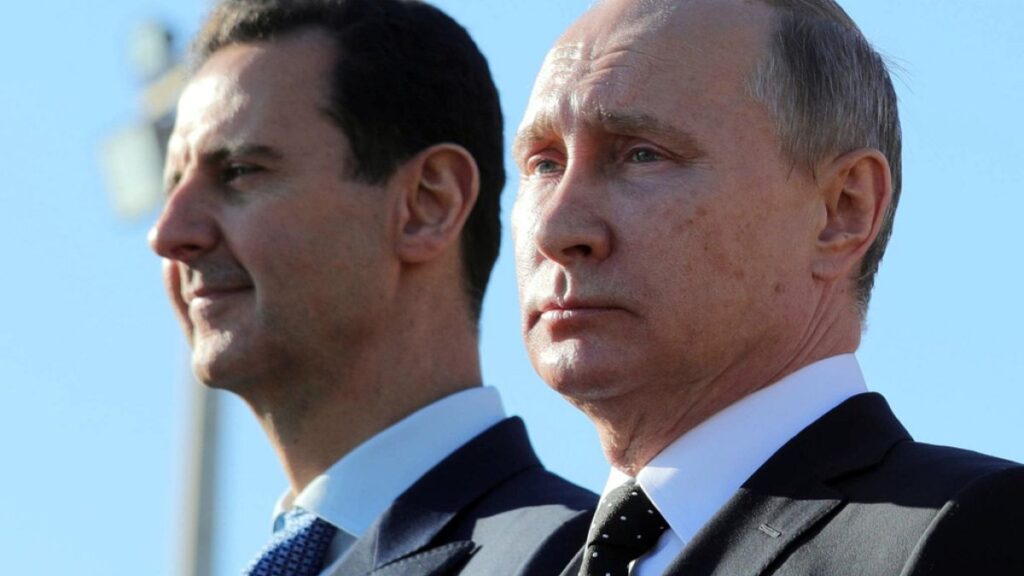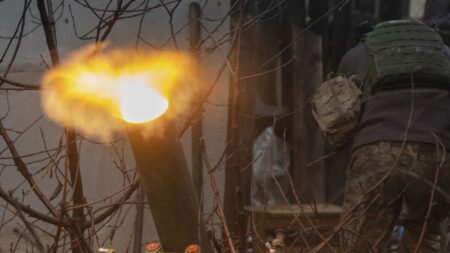Ukraine’s resistance, bolstered by US support, weakens Russia’s military, contributing to the fall of the al-Assad regime, Zelenskyy’s advisor argues.
Just weeks ago, Syrian rebels succeeded in overthrowing Bashar al-Assad’s regime, putting an end to a 13-year-long war.
The long-standing ruler of Syria fled to Moscow, where President Vladimir Putin granted him asylum, marking a clear sign of Russia’s diminishing influence in the region. The offensive was, among others, initiated by the rebel group Hayat Tahrir al-Sham (HTS).
Its leader, Ahmad al-Sharaa, previously known as Abu Mohammed al-Jolani who was once the head of an al-Qaeda offshoot in Syria, now presents himself as a statesman advocating for pluralism and tolerance, engaging in talks with potential international partners, most recently Turkish Foreign Minister Hakan Fidan.
However, his transformation and shift in image have sparked scepticism both domestically and abroad, given his past.
Recently, for the first time in over a decade, a US delegation visited Syria to meet with al-Sharaa. Led by Barbara Leaf, Roger Carstens, and Daniel Rubinstein, the discussions were deemed productive. Still, Washington has tied any potential recognition of his government to tangible progress on minority protection, counterterrorism efforts, and inclusive governance.
Russia’s withdrawal from Syria played a crucial role in the collapse of the al-Assad regime. Andriy Yermak, head of the Ukrainian Presidential Administration, wrote in a Wall Street Journal opinion article about how Ukrainian resistance against Russia, supported by US aid, weakened Moscow and ultimately contributed to the end of al-Assad’s rule.
Yermak argued that supporting Ukraine not only strengthens Europe’s security but also advances the US’ global interests.
How did Russia’s war on Ukraine affect its presence in Syria?
Russia’s ongoing full-scale invasion of Ukraine, now in its third winter, has severely weakened the Kremlin’s military and diplomatic capabilities. The Ukrainian Ministry of Defence regularly reports on the daily losses suffered by Russian forces.
To date, approximately 776,090 Russian soldiers have been killed, and their tank fleet has been reduced by six more vehicles, bringing the total number of destroyed or captured tanks to 9,615. The number of armoured personnel carriers increased by 15, now totalling 19,885, and Russian artillery systems have lost 29 units, leaving just 21,252.
Such losses, according to Yermak, have left Russia unable to properly supply its military bases in Syria — a shipyard in Tartus and an airbase in Khmeimim — and unable to support al-Assad militarily. From these bases, according to Yermak, “Russia and Iran exported their malign anti-Americanism.”
The fall of al-Assad, Yermak stated, is a severe blow to Russia’s credibility. Allies like Iran and authoritarian leaders worldwide must realise that Putin is unable to protect his partners. Moreover, Russia’s influence in the region, particularly in Africa, where it has long benefitted from its presence in Syria, is dwindling.
The weakened support for al-Assad and Hezbollah undermines Russia’s ability to challenge NATO or exert influence in the Middle East and North Africa, according to Ukrainian president’s head of office. Furthermore, the collapse of the al-Assad regime sends a signal to other authoritarian allies of Moscow: Putin’s backing may prove to be worthless.
For Yermak, the war in Ukraine is not only a fight for national sovereignty, but also a strategic tool to strengthen America’s global interests.
“Russia is trying to undermine Ukrainians’ will to keep fighting — but their resolve to preserve freedom and sovereignty remains ironclad”, wrote Yermak. The West must seize this moment to further weaken Russia and curb authoritarian aggression worldwide, he argued.
Ukrainian President Volodymyr Zelenskyy also posted a statement on X, in which he states that Ukraine is interested in stabilising the situation in Syria and the entire region. “We believe that it is crucial for the security of the Syrian people and the entire region to remove any Russian presence from Syria,” Zelenskyy said.
“We are ready to work with the representatives of the Syrian people to correct the mistakes of the al-Assad regime, especially towards Ukraine and Europe as a whole.”
“Ukrainians crave a peace that is just and sustainable, one that protects Ukraine, the US, Europe and our collective interests around the world,” concluded Yermak in his opinion article.
“We must coalesce around new security, economic and legal measures that protect our shared interests. Only this kind of framework will prevent Mr Putin from again threatening and invading Ukraine — and deter authoritarians worldwide from attacking other US allies and partners.”
Consequences of Russia’s intervention
Russia’s intervention in the Syrian civil war in 2015 had far-reaching consequences for Moscow. Essentially, Putin aimed to challenge the US-led international system and secure the survival of an authoritarian regime like al-Assad’s, Anna Borshchevskaya for the Washington Institute said.
According to Borshchevskaya, the intervention served a dual purpose for Russia: preventing the US from toppling another authoritarian regime and defending Russian sovereignty while strengthening its geopolitical position.
Additionally, she claimed that with its intervention in Syria, Moscow had won some respect from the US, its partners and adversaries.
“Western leaders talked a lot — about values, freedom, dignity, the al-Assad regime’s loss of legitimacy and the need for regime change,” Borshchevskaya explained in her article.
“But when push came to shove, they preferred to limit involvement. Putin said little, but did what he said he would do — he saved al-Assad.”
Through its military support for al-Assad, Russia was also able to secure control of the western and central Syrian airspace and establish a permanent military presence in the Mediterranean—its only such presence in the region.
Human Rights Watch reported in 2020 that Russia, during its prolonged intervention, repeatedly targeted civilian infrastructure in Syria, including hospitals, schools, markets, and residential areas.
“International humanitarian law, or the laws of war, requires all warring parties to direct attacks on military objectives, avoid harming civilians or civilian objects, and not carry out attacks that cause indiscriminate or disproportionate civilian harm”, the report reads.
In May 2019, for example, Russian airstrikes hit four hospitals in Idlib within a 12-hour period, according to a New York Times investigation.
Read the full article here

















